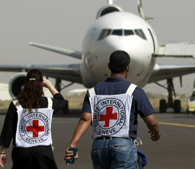
Introducing the notion of sustainability into humanitarian air operations is an important and challenging subject. Important, because we must play our part in this collaborative effort to reduce the environmental impact of air operations while helping to maintain viable socio-economic conditions for our aviation partners. Challenging, because we work within a restrictive technical and regulatory framework while serving our demanding humanitarian programs in the best possible safety conditions.
To meet the requirements for sustainability in humanitarian aviation in the long term, we are notably maintaining our technological monitoring of drones and airships to be able to integrate the best options to come.
To consolidate our environmental approach in the short term, we have launched several initiatives and projects, the main being:
The software used by the ICRC Air operations team was modified to include the Load Factor performance indicator in its flight planning software to optimize air operations with a sustainable approach. This indicator measures the ratio:
Load Factor of the Day (LFoD) = (Total payload transported / Total payload available)
By tracking this ratio, Airops managers can analyze how flights are utilized, ensuring operational and financial performance is maximized while minimizing the environmental footprint. A clear process has been developed, integrating the load factor data into a monthly report shared with the delegation’s management. This process continues to enhance how AirOps team review and improve flight efficiency over time. While operational needs may sometimes require flights with low load factors—such as transporting only one or two passengers, due to specific humanitarian needs—the new system provides data to better understand and optimize these scenarios.
To promote sustainability in ICRC Air Operations, a clause has been introduced in contracts encouraging aviation partners to adopt or maintain good environmental practices and policies. Prior to implementing this clause, a survey was conducted among our contracted airlines to assess their current sustainability efforts. This provided valuable insights, ensuring the clause is practical and consistent with existing practices while supporting Sustainable Supply Chain broader commitment to sustainability across the supply chain. This clause will soon be transposed into our AirOps Service Level Agreement currently being drafted to gradually become more prescriptive.
A comprehensive checklist on aviation waste management was studied during pilot projects. This checklist assesses the current state of aviation waste management and advocates for the adoption of environmentally friendly practices, building on the efforts of ICRC’s fleet teams in managing critical waste such as oil, batteries, and tires. The approach has been integrated into the AirOps global audit program conducted at HQ level, with implementation starting at the end of 2024. This will enable compliance monitoring and drive continuous improvements in aviation waste management practices from 2025 onwards.
